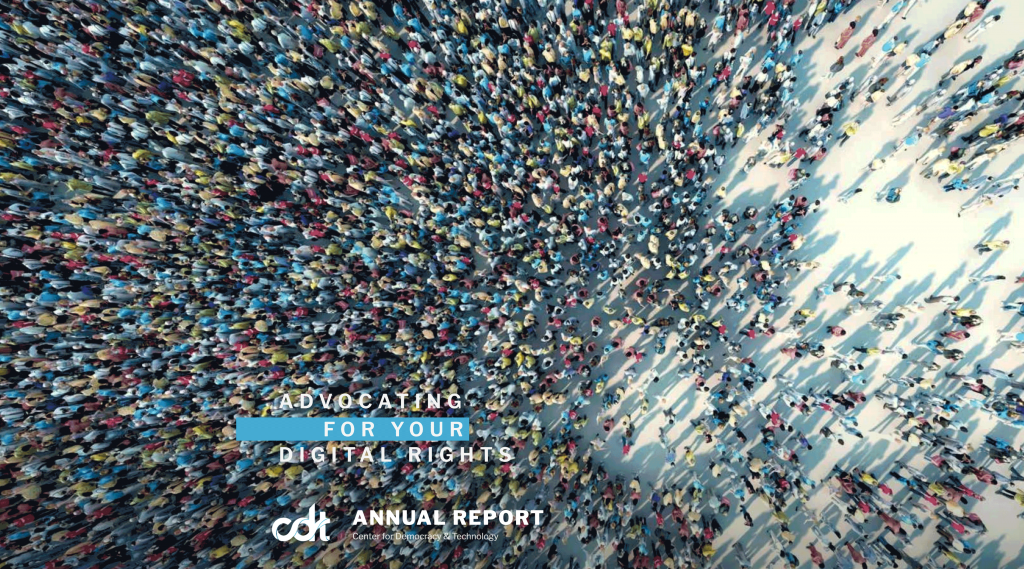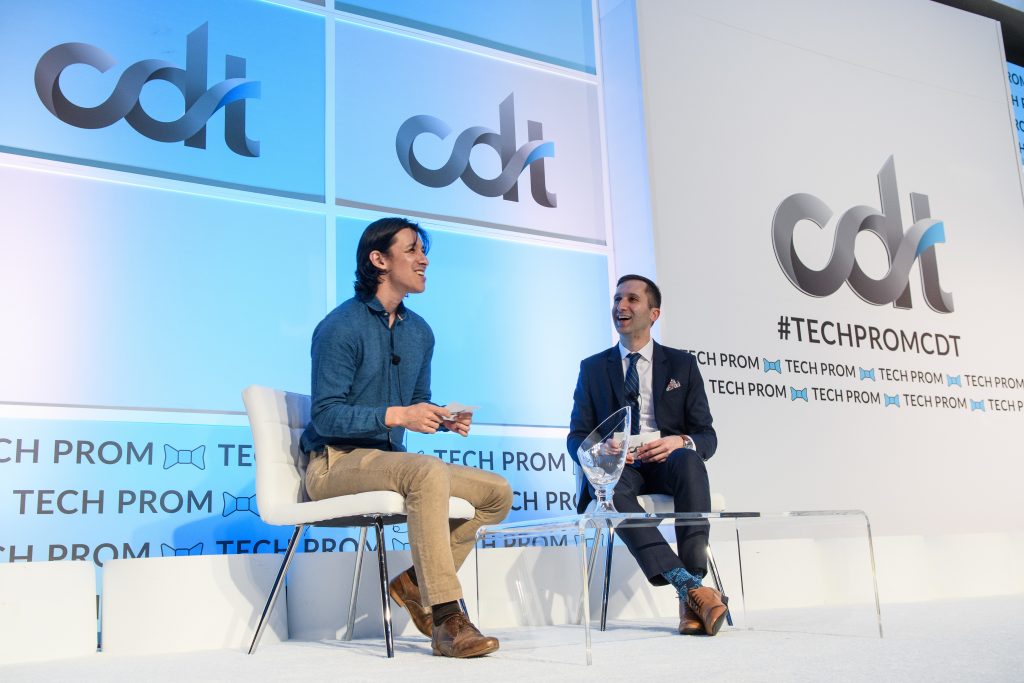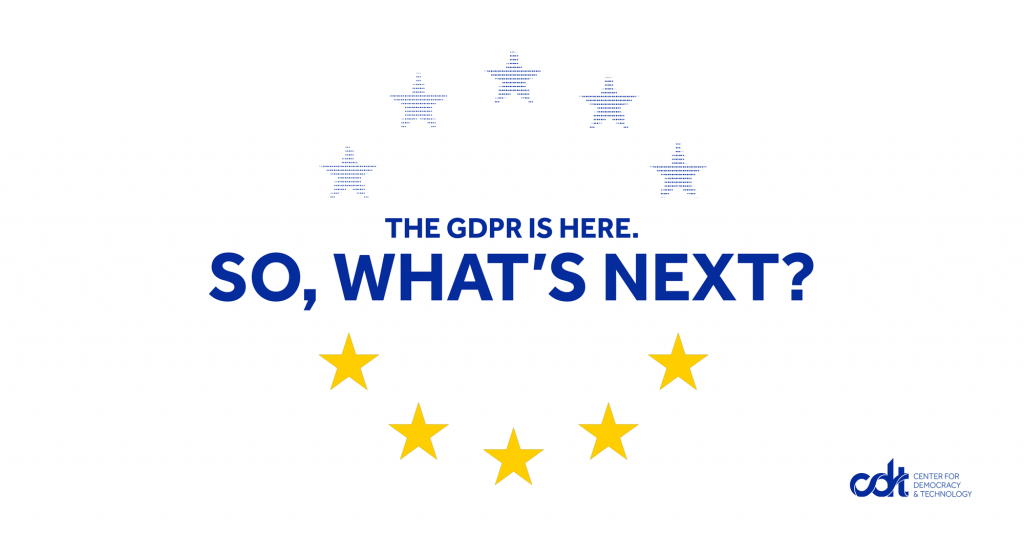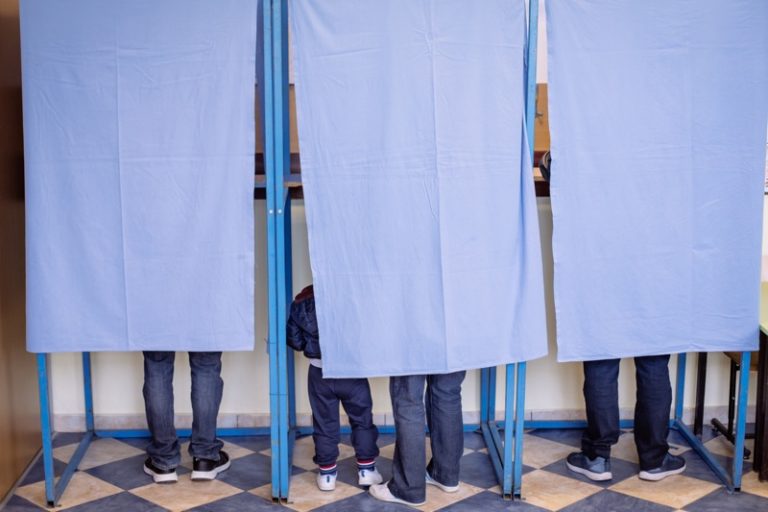
Letter From Our Former CEO
Nuala O’Connor, former President & CEO of CDT, reflected on the progress made in 2018 on advancing the privacy rights of all: “We must rethink the old paradigms governing our data-driven world and return power to the individual.”
Below are some of our proudest accomplishments from the previous year, covering every issue we work on and involving every person on our team. Our work has never been more important.

Opposing Laws that Chill Legal Speech
In attempting to address the serious issue of sex trafficking, Congress passed a law that has already had a chilling effect on online speech. FOSTA creates broad new categories of illegal speech and weakens strong liability protections for online content hosts, without evidence that it actually reduces trafficking. CDT actively opposed the law before it was passed and is an amicus in Woodhull v. US, which challenges the law on First Amendment grounds.

Suing the FCC for Repealing Net Neutrality Protections
CDT filed suit against the Federal Communications Commission over the agency’s plans to repeal net neutrality. Ensuring that all internet traffic is treated equally is good for both consumers and business, and CDT will continue working to protect an open internet.

Mitigating Bias in Mobile Health Apps
Mobile technology is putting health data directly in the hands of individuals, allowing them to gain new insight into their bodies and minds. These tools have the potential to improve personal health, yet many mHealth apps also carry risks of producing interventions based on biased data. In our paper, Healgorithms: Understanding the Potential for Bias in mhealth Apps, we uncover places of potential bias and offer recommendations for how to avoid them.

Protecting Security Researchers
Security researchers often need to circumvent digital locks to effectively do their job, but provisions of the Digital Millennium Copyright Act put such efforts in an uncertain legal zone. CDT asked the U.S. Copyright Office to remove many of the limitations and conditions so that researchers could legally protect against flaws in everything from cars to medical devices. The Office granted most of our requested exemptions.

Winning at the Supreme Court on Cell Location Information
In a victory for the Fourth Amendment, the Supreme Court found that a warrant is required when a suspect has a legitimate privacy interest in records held by a third party. In Carpenter v. U.S., the government obtained four months of cell-site location information while investigating a series of robberies, without getting a warrant. The Supreme Court decision was directly aligned with the amicus brief CDT filed in the case.

Exploring the Limits of Automated Content Moderation
Today’s tools for automating social media content analysis have limited ability to parse the nuanced meaning of human communication. In our paper, Mixed Messages, we explain the capabilities and limitations of tools for analyzing the text of social media posts and other online content.

Focusing on the Good at Tech Prom
At our annual dinner, Tech Prom, Kickstarter Founder and Chairman Perry Chen was honored with the CDT Digital Visionary Award. Nearly 1,000 of most of the influential minds of today’s tech policy world attended the event, which focused on how technology can be used for good.
Translating GDPR for Policymakers and Consumers
When the European Union’s General Data Protection Regulation (GDPR) took effect in May, policymakers in the U.S., as well as general consumers in both the U.S. and EU, wanted to know what it meant for U.S. companies and the data right of the global citizen. CDT was a leading voice in highlighting the benefits of the new law, while noting some shortfalls that could be addressed in future laws.


Stopping the Automation of Extreme Vetting
When U.S. Immigration and Customs Enforcement (ICE) announced that it was looking for machine-learning tools to continuously monitor U.S. visitors’ and immigrants’ social media posts to predict who should be allowed into the country. and who should be deported, CDT aggressively opposed the effort. Working alongside other advocates, we influenced ICE’s final decision to not pursue an automated solution.

Improving Trust in VPNs
Virtual private networks (VPNs) are a tool for people wanting to take more control of their online privacy. But not all VPNs are created equal. To help consumers better assess their trustworthiness, CDT developed a series of questions and recommendations for VPN providers that, when addressed, serve as a strong signal for which VPN can be trusted with your personal browsing information.

Promoting Greater Transparency Around Online Content Moderation
Major tech companies make countless decisions each day about what user-generated content to remove or promote. To enhance the free expression rights of internet users, CDT has advocated for increased transparency around content moderation tools and policies, which culminated in significantly improved transparency practices from some major platforms.

Saying No to the Unnecessary Collection of Social Media Identifiers
The U.S. State Department proposed collecting social media identifiers used in the last five years from 14.7 million immigrant and nonimmigrant visa applicants. CDT quickly filed and joined comments in opposition, highlighting its detrimental impact on free speech and association.

Scooting Toward Better Privacy for Dockless Mobility
Dockless mobility services, such as scooters, generate a tremendous amount of data and are certain to serve as a template as cities race to create new standards to collect and analyze mobility data. CDT is working to ensure that key privacy and security practices are part of these efforts.

Challenging the EU’s Approach to Online Terrorist Content
The European Commission released a draft regulation on preventing the dissemination of terrorist content online that has profound implications on free speech rights. The far-reaching proposal would regulate and restrict various types of online content, both legal and illegal, while mandating proactive monitoring and removal of content. CDT offered a series of recommendations to improve the proposed regulation and will continue to engage throughout the legislative process.
Bringing Tech Policy to Playlists
Now with more than 25,000 plays, CDT’s podcast, Tech Talk, brings hours of engaging and informative conversations about tech and internet policy. You can find CDT’s Tech Talk on Spotify, SoundCloud, iTunes, and Google Play, as well as Stitcher and TuneIn.

Informing Congress in the Wake of Cambridge Analytica
After the news that data from Facebook was shared with Cambridge Analytica and used for political profiling during the 2016 U.S. presidential election, Congress held hearings to uncover what happened and begin the process of addressing such data misuses. CDT was front and center during these hearings, testifying on key issues, preparing questions for members of Congress, and engaging the broader public in the debate through the media.

Applying a Human Rights Framework to Cross Border Data Demands
Proposals easing law enforcement access to data flowing across borders advanced in the U.S. and the European Union. CDT called on policymakers in Europe to amend the e-Evidence proposals to promote the human rights of European citizens and others with respect to their data. In the U.S., while we secured some improvements, CDT ultimately opposed the CLOUD Act because it did not require judicial authorization for law enforcement access to internet users’ data. Prior to the CLOUD Act making the case moot, CDT filed an amicus brief in U.S. v. Microsoft, calling for warrant requirements for data stored in another country.
Addressing Privacy Concerns Around School Safety Proposals
In the wake of tragedy, Florida passed the Marjory Stoneman Douglas High School Public Safety Act. Aimed at improving school safety, it will lead to the collection and integration of large amounts of data without first proving this effective, establishing boundaries on its use, or articulating clear data protocols. CDT is working to educate policymakers on the privacy and security risks for students that can result from this type of legislation.

Supporting Strong Encryption in Australia
CDT has long advocated for strong encryption and against any mandated backdoors in technology for law enforcement. We took our advocacy efforts to Australia to oppose a controversial law that would mandate breaking encryption for law enforcement and intelligence access. Unfortunately, the law passed, but CDT will continue its staunch opposition to weakening encryption, which puts the privacy and security of everyday citizens at risk.
There are some important themes in the work of our team in 2018. We explore what those features are, what we did, and what kind of impact they’ve had. Take a deep dive with us.
Advancing a Federal Privacy Law to Protect Our Digital Rights
Privacy is a fundamental human right. Physical safety, free expression, access to justice, and economic security depend on it. For too long, Americans’ digital privacy has varied widely, hinging on the technologies and services we use, the companies that provide those services, and our capacity to navigate confusing notices and settings. It’s time for Congress to pass legislation providing comprehensive protections for personal information that can’t be signed away.

Improving the Privacy of Students
Over the last decade, the education sector has embraced the power of data and technology to improve student outcomes, but its efforts to fulfill legal and ethical responsibilities have not always kept pace. When educators, administrators, and educational companies fail to meet their responsibilities to protect students’ privacy and appropriately use data about them, they jeopardize public trust and put individuals at risk.

Making the 2018 Midterm Election More Secure
Core to a healthy democracy are free and secure elections. In recent years, sophisticated disinformation operating and aging computerized election infrastructure have eroded the confidence of voters, and placed core democratic principles at risk. CDT worked to address key election cybersecurity issues in 2018, including election official training, technical volunteer capacity building, and robust post-election auditing.

Financials

CDT is committed to sound financial stewardship and transparency. We have received clean audits each year from an independent auditing firm and have high ratings from nonprofit watchdogs Charity Navigator and GreatNonprofits. Our profuse thanks to our donors who make our work possible.
Board & Council
We are especially grateful to those who offer important insights on a regular basis and help to guide our work. We could not have such an outsized impact without your energy and efforts.
Previous Years
Reports from previous years.

